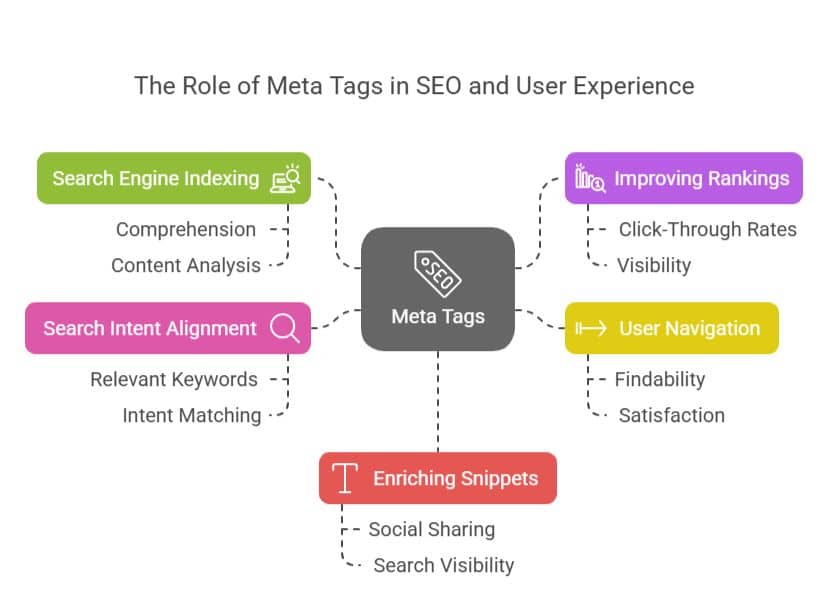
Meta tags play a key role in improving search rankings by boosting content visibility and helping search engines accurately index your pages. They offer clear, concise summaries that make it easier for both users and search engines to understand what a webpage is about, which can increase click-through rates (CTR). A higher CTR tells search engines that your content is relevant, which can lead to better rankings. Additionally, well-optimized meta tags enhance the user experience and make your content easier to find, especially on mobile devices. By mastering the use of meta tags, website owners can strategically improve their search performance and stay competitive. Explore more to uncover the impact of meta tags on search ranking.
Key Takeaways
- Search engines rely on meta tags to properly index and comprehend the content of webpages.
- Search engine rankings are improved by effective meta descriptions since they raise user click-through rates.
- Meta tags help users navigate and be more satisfied by making material easier to find.
- Relevant meta keywords align with search intent, increasing chances of appearing in relevant searches.
- Structured meta data enriches snippets, making content more appealing for social sharing and search visibility.

1. Summary of Content

Meta tags, comprising elements like the meta description, serve as a vital component of search engine optimization (SEO) strategies. Their importance lies in their ability to influence content visibility and website performance.
Meta tags provide search engines with essential information about a webpage, assisting in the accurate indexing of content. This process is crucial because search engines rely on these indexing factors to determine the relevance and ranking of a website in search results.
The meta tag importance extends beyond basic identification. While the content of a webpage holds significant weight, meta tags play a supportive role by summarizing the page’s content for both search engines and users. This summary aids search engines in understanding the topic and context of the page, which in turn can enhance content visibility. A well-crafted meta description, for instance, can entice users to click on a link, thereby increasing traffic and potentially improving website performance.
Moreover, meta tags contribute to the efficiency of search engine algorithms in categorizing and ranking webpages. By providing a clear, concise description of the page’s content, they help streamline the indexing process.
Accurate and relevant meta tags ensure that a webpage is more likely to be displayed in search results, aligning with the user’s search intent.
2. Keyword Relevance

The concept of keyword relevance is paramount in enhancing a website’s search engine optimization (SEO) strategy. It serves as the cornerstone of connecting a website’s content with the search queries entered by users, thereby optimizing its visibility.
Effective keyword optimization begins with understanding search intent, which refers to the underlying reason behind a user’s query. By aligning content with the correct search intent, businesses can increase their chances of appearing in relevant search results.
Content relevance is another critical aspect, as it ensures that the information provided on a webpage is pertinent to the keywords targeted. This involves integrating keywords naturally within the content, maintaining a focus on quality over quantity. The goal is to ensure that the content not only addresses the search intent but also provides value to the reader, thereby fostering trust and authority in the domain.
Competitive analysis plays a vital role in keyword relevance by offering insights into what competitors are doing effectively. By examining the keywords that competitors are ranking for, businesses can identify potential opportunities and gaps within their own strategy. This includes assessing their on page SEO elements, such as title tags and meta descriptions, to establish a competitive advantage.
Ultimately, keyword relevance is a dynamic process that requires continual refinement. As search algorithms evolve, so too must the strategies employed by businesses to remain at the forefront of search results.
3. Click-Through Rates (CTR)
Having established the importance of keyword relevance in optimizing search rankings, attention must now be directed toward another critical factor: Click-Through Rates (CTR).
CTR is a pivotal component in the complex ecosystem of ranking factors that search engines use to determine the relevance and value of a webpage. Essentially, CTR measures the percentage of users who click on a specific link after seeing it in search results, and it’s closely tied to how well a page aligns with user search intent.
Meta visibility plays a crucial role in influencing CTR. When users are presented with a list of search results, the clarity and appeal of a page’s title and meta description can significantly impact their decision to click. Crafting descriptive and enticing meta tags can enhance meta visibility, thereby increasing CTR and improving content discovery by aligning web content with users’ search intent.
Moreover, optimization strategies that focus on boosting CTR are integral to enhancing search rankings. High CTRs signal to search engines that users find the content relevant and valuable, which can lead to improved rankings over time.
Thus, businesses and content creators should prioritize developing compelling meta tags that accurately reflect the content’s purpose and value.
4. User Experience

User satisfaction is a cornerstone of effective search engine optimization, directly impacting both engagement and rankings. In the realm of digital marketing, user experience (UX) is pivotal for retaining visitors and enhancing their interaction with your content.
Meta tags play a critical role in this process by improving content discoverability, ensuring that users can easily find the information they seek. When a user encounters a well-structured and relevant meta description, it sets the stage for positive user engagement by aligning their expectations with the content provided.
Moreover, as mobile optimization becomes increasingly vital, ensuring that your meta tags are responsive and adaptable to various screen sizes is essential. A significant portion of users access websites through mobile devices, and if their experience is hindered by poor navigation or improperly displayed content, their trust in the site diminishes.
This can lead to higher bounce rates and reduced time on site, adversely affecting search rankings. Effective site navigation further enhances user trust by creating a seamless journey for users to explore related content.
Meta tags can guide this navigation by providing clear and concise descriptions that help users understand the context and relevance of each page. By fostering a user-friendly environment, websites can encourage deeper engagement, leading to longer visit durations and increased interaction.
5. Social Sharing and Snippets

Optimizing user experience lays a solid foundation for digital engagement, and this focus naturally extends to how content is shared and perceived beyond the immediate website visit. In today’s digital landscape, social media plays a pivotal role in content dissemination, making snippet optimization essential for enhancing content visibility.
Snippets, often the first impression users have of a webpage, are crucial in enticing clicks and fostering user engagement. Therefore, crafting compelling snippets that are tailored for both search engines and social platforms enhances sharing strategies, leading to a broader audience reach and potentially higher search rankings.
To effectively leverage social sharing and snippets, consider the following strategies:
- Enhance Content Visibility: Ensure that your meta tags, particularly the meta description and title tags, are concise yet descriptive. These elements should encapsulate the essence of your content, appealing not only to search engines but also capturing the interest of users scrolling through social media feeds.
- Focus on Snippet Optimization: Use structured data to enrich your snippets with additional details such as ratings, reviews, or images. This not only improves the attractiveness of your content in search results but also increases the likelihood of it being shared across various platforms.
- Adopt Effective Sharing Strategies: Encourage user engagement by including share buttons on your webpages. This facilitates easy sharing on social media, amplifying your content’s reach.
Moreover, providing pre-written shareable content or engaging headlines can significantly enhance the likelihood of user interaction.
Final Thoughts
Meta tags are a fundamental part of any SEO strategy, enhancing both search engine rankings and user engagement. By crafting keyword-rich, compelling meta tags such as title tags and descriptions, websites can improve visibility and click-through rates. Meta tags also enhance user experience by providing clear, relevant content summaries, making navigation easier and improving mobile responsiveness. Additionally, they play a critical role in social sharing and structured snippets, amplifying content reach.
Need help optimizing your meta tags for better search performance? Connect with Syville Gacutan, an experienced SEO Specialist in the Philippines, for expert guidance on creating effective meta tags that boost visibility, enhance user experience, and drive organic traffic. Contact Syville today for professional SEO solutions!